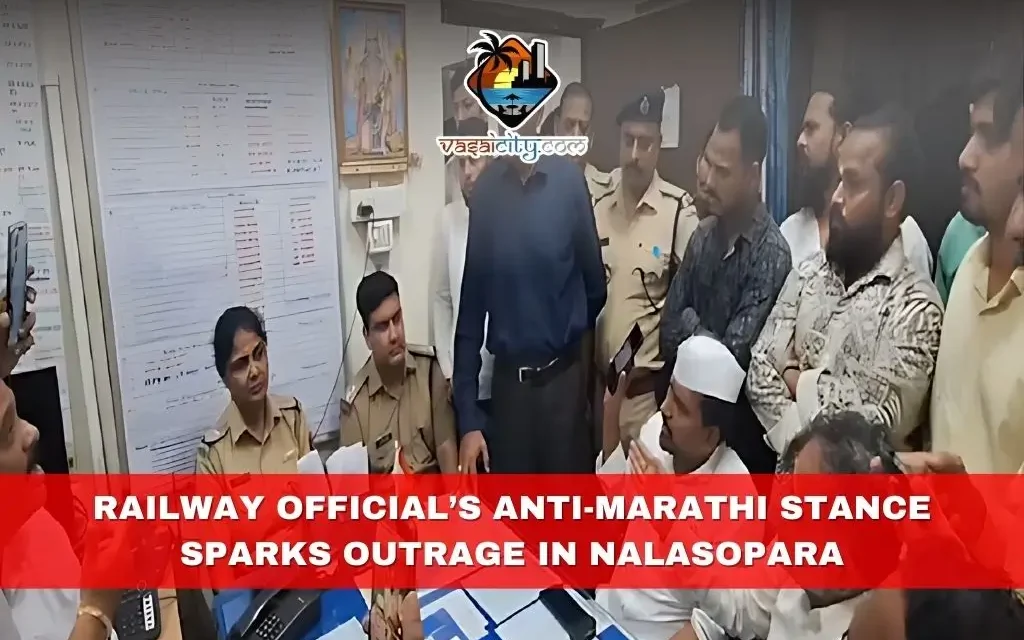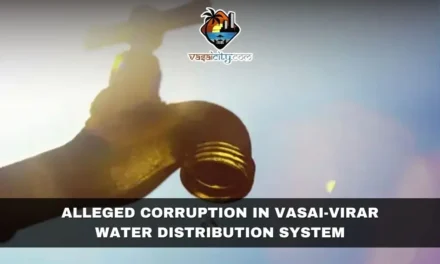An incident at Nalasopara Railway Station, involving a ticket collector’s refusal to communicate in Marathi, has stirred up significant outrage online and prompted fresh demands for language respect within public services. The issue, which has gone viral on social media, follows another similar incident in Mumbai last month, intensifying local debates about the treatment of Marathi-speaking commuters within Maharashtra’s railway network.
The story unfolded on a Sunday evening when Amit Patil, a resident of the Mumbai Metropolitan area, along with his wife, was returning home after celebrating the Bhau Beej festival with family. The couple was making their way home by local train, a popular and essential form of public transport for residents in the region. Their journey took a frustrating turn when they arrived at Nalasopara station, and a railway ticket collector (TC) stopped them for a routine ticket check. The Patils, however, faced an unexpected language barrier during this interaction.
An Encounter Goes Viral
Upon being asked to present their tickets, the Patil couple responded, but they realized quickly that they could not understand the ticket collector’s language—he was speaking only in Hindi. Since Amit and his wife are more comfortable in Marathi, they requested the TC to switch to Marathi for clarity. Their request seemed reasonable, especially as Nalasopara is located in Maharashtra, where Marathi is not only a prominent language but is also widely used in official communications.
The ticket collector, however, reportedly responded with hostility. According to Mr. Patil, the TC insisted, “We are Indian. We will speak in Hindi. Marathi won’t be used in the railway.” This rigid refusal to use Marathi left the couple shocked and frustrated. When they tried to explain their discomfort and reiterated their request for Marathi, the TC allegedly went further by threatening them and escalating the situation.
What happened next only added to the Patils’ distress. The ticket collector, who has since been identified as Ritesh Morya, reportedly detained the couple and insisted they sit in the Railway Protection Force (RPF) office located on the premises. He also demanded that they write a statement affirming that Marathi would not be used with railway officials—a request the Patils found deeply upsetting and offensive. During this incident, Mr. Patil’s wife attempted to capture a video of the exchange to document what she felt was unfair treatment. However, the TC allegedly forced her to delete the video, removing a potential piece of evidence of his actions.
Public Outrage and Calls for Accountability
The incident has since been widely discussed on social media, with numerous individuals expressing anger and disappointment at the ticket collector’s conduct. The video, though only containing limited footage of the interaction, has struck a chord with Marathi-speaking communities who feel the need to address the perceived disrespect toward their language. Many see the incident as emblematic of a broader issue— the erasure or sidelining of Marathi in a state where it is not only a mother tongue for millions but also an official language.
After learning about the incident, members of the Vasai-Virar Marathi Ekikaran Samiti stepped in to support the Patil family. The committee, which advocates for the rights and representation of Marathi speakers in the region, publicly condemned the actions of the ticket collector. Furthermore, the group organized a protest at the Nalasopara railway station, entering the railway office to demand accountability and urging officials to address what they deemed an instance of “anti-Marathi sentiment.” This protest saw the committee and other supporters sit-in at the station, with participants calling for an investigation and appropriate disciplinary action against the ticket collector.
In addition to the public outcry, this incident has raised questions regarding the role of language in public services, especially in regions with strong linguistic identities like Maharashtra. For many residents, the expectation is that public officials, particularly those in customer-facing roles, will be sensitive to local languages, which helps build rapport and trust with commuters who depend on these services daily. Given that the railway is a public service and that it serves a large Marathi-speaking population, critics argue that accommodating Marathi speakers should be standard practice.
Authorities Respond and Future Actions
In light of the growing outrage, railway authorities are now under pressure to take action. While there is no formal update on potential disciplinary measures yet, the case has gained enough attention that officials are likely to investigate the conduct of the ticket collector involved. The outrage follows a recent incident in Mumbai where another ticket collector was suspended after being filmed in a similar altercation with Marathi-speaking commuters. This trend is causing public officials to re-evaluate training for railway staff on cultural and linguistic sensitivity.
Local leaders and politicians have also voiced their concern, some calling for improved training programs for railway staff that highlight the importance of language respect in public services. They emphasize that Maharashtra, as a linguistically diverse state, requires particular attention to ensure that Marathi speakers feel respected and accommodated.
Supporters of the Patil family, along with members of the Vasai-Virar Marathi Integration Committee, are determined to pursue this case to its resolution. The goal, they say, is not only to secure accountability for Mr. Patil and his wife but also to send a clear message to railway officials across Maharashtra: that respect for Marathi should be a part of daily interactions with the public. Many are hopeful that this incident, while unfortunate, will ultimately lead to a more inclusive approach within the railway system, one that respects the state’s cultural and linguistic heritage.
Reflecting a Broader Debate on Language in Public Services
For many, the incident touches on broader themes of identity and respect. Language, as a crucial part of one’s cultural identity, plays a significant role in public interactions. While India is a multilingual nation, and Hindi is widely spoken and understood, each state has its own linguistic priorities. In Maharashtra, Marathi holds a special status, not just in official functions but as a marker of local pride and identity. Hence, incidents like these are often viewed as more than simple misunderstandings; they are seen as reflections of an ongoing debate about the place of regional languages in the country.
As this story continues to unfold, it is likely to prompt further conversations around the responsibilities of public officials in linguistic-sensitive regions. The public response to the incident at Nalasopara shows that citizens are willing to advocate for their language rights, reminding authorities that respect for regional languages is essential in fostering trust and cooperation between the public and government agencies.
This incident serves as a reminder of the need for empathy, respect, and flexibility in our diverse society. For now, Marathi-speaking commuters and supporters await updates on the outcome of the investigation, hopeful that the railway administration will take steps to prevent similar occurrences in the future.













